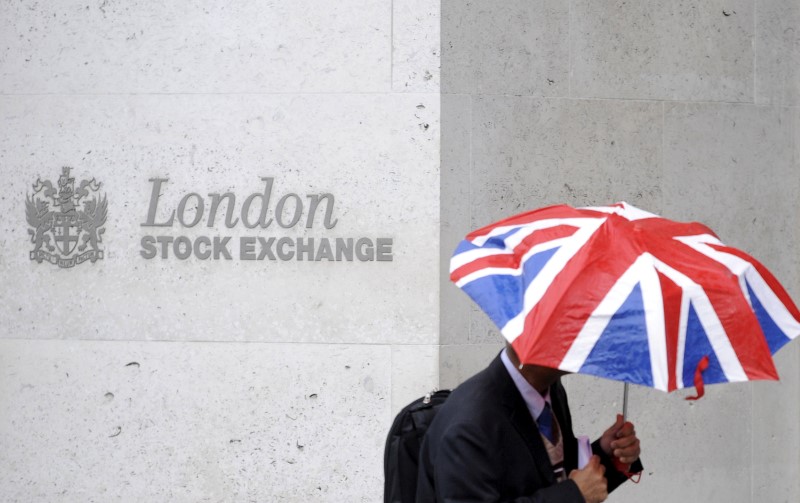By Atul Prakash and Sudip Kar-Gupta
LONDON (Reuters) - Britain's top share index closed lower on Monday after energy stocks came under pressure following a drop in crude oil prices and gold miners tracked weaker precious metals.
The blue-chip FTSE 100 index (FTSE) finished 0.5 percent lower at 6,986.40 points, further away from a record high of 7,129.83 points reached on Oct. 11. The FTSE 250 mid-cap index (FTMC) fell 0.4 percent.
The UK oil and gas index (FTNMX0530) dropped 0.6 percent as oil prices slid after Iraq said it wanted to be exempt from an OPEC deal to cut production.
"It’s becoming increasingly clear that Saudi Arabia, along with the UAE and Kuwait will have to shoulder most of the output cut for it to have any chance of happening," Jasper Lawler, analyst at CMC Markets, said.
Shares in BP (L:BP), Royal Dutch Shell (L:RDSa) and Tullow Oil (L:TLW) fell 0.4 to 1.8 percent.
Gold miners also lost ground as gold prices <XAU=> surrendered early gains to trade lower. Randgold Resources (L:RRS) and Fresnillo (L:FRES) shares were down 2.4 percent and 2 percent respectively.
Mid-cap aerospace and defence company Cobham (L:COB) slumped 13 percent after the company issued its second profit warning in six months.
"Capital allocation decisions seem to suggest a management fixated on following the 'institutional imperative' to increase business scope rather than necessarily increase per share business value," Gary Paulin, head of global equities at Northern Trust, said in a note.
On the positive side, Provident Financial (L:PFG) rose 2.8 percent, the top gainer in the FTSE 100 index, after Goldman Sachs (NYSE:GS) raised its price target on the stock. Budget airline easyJet (L:EZJ) climbed 1.4 percent after UBS upgraded it to "buy" from "neutral".
TV and media company ITV (L:ITV) outperformed the broader market and closed 0.5 percent higher after AT&T's (N:T) planned $85 billion takeover of Time Warner (N:TWX) raised the prospect of similar consolidation in Europe.
"The AT&T/Time Warner deal faces regulatory scrutiny, but the deal is nevertheless raising the possibility of similar sector consolidation within Europe," said Beaufort Securities' sales trader Basil Petrides.
The blue-chip FTSE 100 index is up around 13 percent since the start of 2016, but down by around 7 percent in U.S. dollar terms, due to a slump in sterling caused by Britain's shock Brexit vote in June to quit the European Union.
The fall in sterling has given a boost to many of the FTSE 100's international companies which earn much of their revenues in U.S. dollars, and therefore get a currency-related accounting lift as those dollars are converted back to pounds.

However, the drop in the U.S. dollar value of FTSE 100 stocks is a potential negative for overseas investors for whom the dollar is their benchmark currency reference.